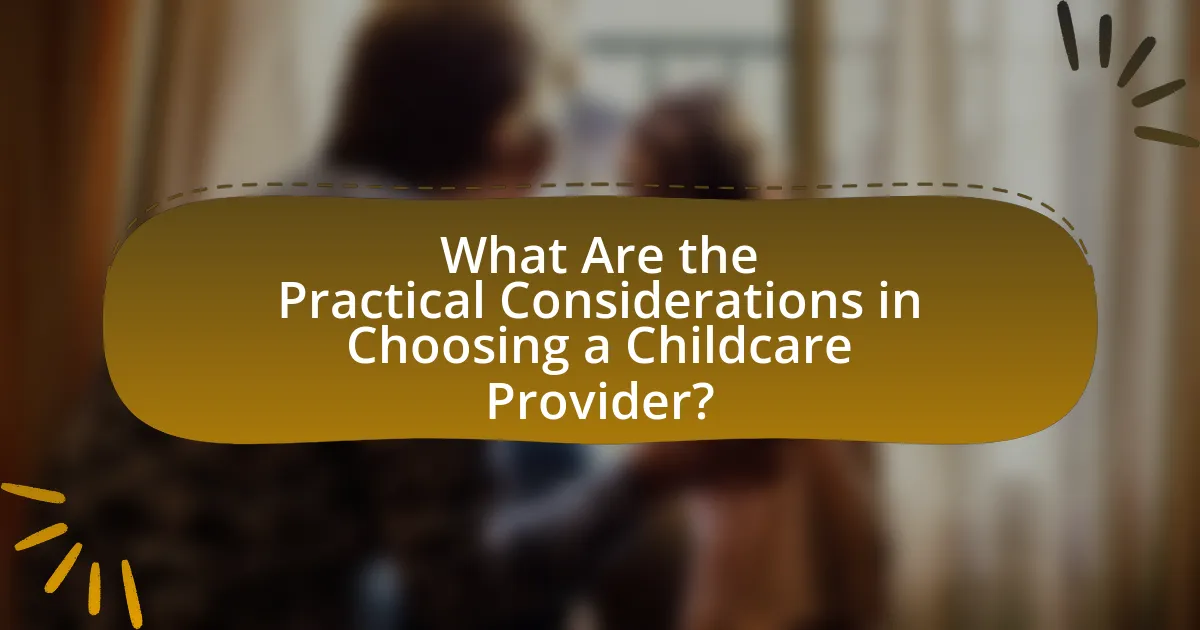Choosing the right childcare provider is a critical decision for parents, influenced by various factors such as licensing, staff qualifications, safety standards, and the provider’s philosophy on child development. The article outlines essential considerations, including the specific childcare needs based on a child’s age and requirements, the types of available providers, and the differences between daycare centers and home-based care. It emphasizes the importance of evaluating potential providers through research, interviews, and facility assessments, while also addressing practical aspects like cost, location, and flexibility. Key qualities to look for in a provider, along with tips for making an informed decision, are also discussed to aid parents in selecting the best childcare option for their family.

What Factors Should You Consider When Choosing a Childcare Provider?
When choosing a childcare provider, consider factors such as licensing, staff qualifications, safety standards, and the provider’s philosophy on child development. Licensing ensures that the facility meets state regulations, which is crucial for safety and quality. Staff qualifications, including education and training in early childhood development, directly impact the quality of care and education your child receives. Safety standards, such as secure premises and emergency procedures, are essential for protecting children. Additionally, understanding the provider’s philosophy helps ensure that their approach aligns with your values and expectations for your child’s growth and learning.
How do your childcare needs influence your choice?
Childcare needs significantly influence the choice of a childcare provider by determining the type of care required, such as full-time, part-time, or specialized services. For instance, parents with demanding work schedules may prioritize providers that offer flexible hours or extended care options. Additionally, specific needs like special education services or language immersion programs can narrow down choices to providers that cater to those requirements. Research indicates that 70% of parents consider the availability of specific programs when selecting childcare, highlighting the importance of aligning provider offerings with individual family needs.
What age group does your child belong to?
The age group your child belongs to is crucial for selecting an appropriate childcare provider. Children typically fall into specific age categories: infants (0-12 months), toddlers (1-3 years), preschoolers (3-5 years), and school-age children (5 years and older). Understanding your child’s age group helps in identifying providers that specialize in the developmental needs and activities suitable for that specific age range. For instance, many childcare centers offer tailored programs that align with the cognitive and social development milestones typical for each age group, ensuring that the care provided is both age-appropriate and beneficial.
What specific care requirements does your child have?
The specific care requirements of a child may include medical needs, developmental support, dietary restrictions, and emotional or behavioral considerations. For instance, a child with asthma may require access to inhalers and a plan for managing asthma attacks, while a child with autism may need tailored communication strategies and sensory-friendly environments. These requirements are essential for ensuring the child’s health, safety, and overall well-being, as evidenced by studies indicating that individualized care plans significantly improve outcomes for children with special needs.
What types of childcare providers are available?
There are several types of childcare providers available, including family daycare, center-based daycare, nanny services, and babysitting services. Family daycare involves care provided in a caregiver’s home, typically accommodating a small number of children, which allows for a more personalized environment. Center-based daycare operates in larger facilities and can cater to a greater number of children, often offering structured programs and activities. Nanny services provide individualized care in the child’s home, allowing for flexibility in scheduling and personalized attention. Babysitting services are typically short-term and can be arranged for occasional care needs. Each type of provider offers distinct advantages and may suit different family needs based on factors such as the number of children, desired structure, and flexibility.
What are the differences between daycare centers and home-based care?
Daycare centers and home-based care differ primarily in their environment and structure. Daycare centers are typically larger facilities that provide care for multiple children, often following a structured curriculum and operating on set hours. In contrast, home-based care is usually provided in a caregiver’s home, offering a more intimate setting with fewer children, which can lead to personalized attention and flexibility in scheduling. Research indicates that children in home-based care may experience more individualized interactions, while those in daycare centers benefit from socialization with peers and structured activities.
How do nanny services compare to other childcare options?
Nanny services provide personalized, one-on-one care, which distinguishes them from other childcare options like daycare centers or babysitters. Unlike daycare centers that often have a fixed schedule and multiple children, nannies can tailor their care to the specific needs and routines of a single family, offering flexibility in hours and activities. Research indicates that children in nanny care often receive more individualized attention, which can enhance their emotional and social development. Additionally, nannies can assist with household tasks related to childcare, providing added convenience for parents. In contrast, daycare centers may offer structured educational programs but lack the personalized approach that nannies provide.
What are the key qualities to look for in a childcare provider?
The key qualities to look for in a childcare provider include experience, qualifications, and a nurturing demeanor. Experience ensures that the provider has practical knowledge in managing children’s needs and behaviors, while qualifications, such as certifications in early childhood education or first aid, demonstrate a commitment to safety and development. A nurturing demeanor is crucial as it fosters a supportive environment where children feel secure and valued. Research indicates that children thrive in settings where caregivers exhibit warmth and responsiveness, which enhances their emotional and social development.
How important is the provider’s experience and qualifications?
The provider’s experience and qualifications are critically important in selecting a childcare provider. Experienced providers are more likely to have developed effective caregiving skills, understand child development, and manage emergencies effectively. Research indicates that children benefit from high-quality care, which is often linked to the provider’s training and experience. For instance, a study published in the journal “Child Development” found that children in care settings led by well-qualified providers showed better social and cognitive outcomes compared to those in less experienced settings. Therefore, prioritizing a provider’s qualifications and experience is essential for ensuring quality childcare.
What role does the provider’s philosophy and approach to childcare play?
The provider’s philosophy and approach to childcare significantly influence the developmental environment and learning experiences offered to children. A provider’s philosophy shapes their practices, guiding how they interact with children, structure activities, and foster relationships. For instance, a play-based philosophy emphasizes exploration and creativity, which can enhance cognitive and social skills, while a more structured approach may focus on academic readiness. Research indicates that alignment between a child’s needs and the provider’s philosophy can lead to better developmental outcomes, as seen in studies showing that children thrive in environments that reflect their learning styles and emotional needs.

How Can You Evaluate Potential Childcare Providers?
To evaluate potential childcare providers, you should conduct thorough research, including checking credentials, visiting facilities, and interviewing staff. Start by verifying the provider’s licensing and certifications, which ensures compliance with local regulations and standards. Next, visit the facility to assess the environment, safety measures, and available resources. During interviews, ask about staff qualifications, child-to-provider ratios, and their approach to child development. Additionally, seek references from other parents and read online reviews to gauge satisfaction levels. According to the National Association of Child Care Resource & Referral Agencies, quality childcare significantly impacts child development, making these evaluations crucial for informed decision-making.
What steps should you take to research childcare options?
To research childcare options, start by identifying your specific needs, such as location, hours of operation, and type of care required. Next, gather information by searching online directories, local community resources, and recommendations from friends or family. After compiling a list of potential providers, visit each facility to observe the environment, meet staff, and ask questions about their policies and practices. Finally, check reviews and ratings on platforms like Care.com or Yelp to assess the experiences of other parents. This systematic approach ensures you make an informed decision based on thorough research.
How can you find reviews and testimonials for providers?
To find reviews and testimonials for childcare providers, utilize online platforms such as Google Reviews, Yelp, and specialized childcare directories like Care.com. These platforms aggregate user-generated content, allowing parents to read firsthand experiences and ratings from other families. According to a 2021 survey by Bright Horizons, 70% of parents rely on online reviews when selecting childcare options, highlighting the importance of these resources in decision-making.
What questions should you ask during interviews with providers?
During interviews with childcare providers, you should ask questions that assess their qualifications, experience, and approach to childcare. Key questions include:
- What is your educational background and training in early childhood education?
- How many years of experience do you have working with children of similar ages?
- Can you describe your daily routine and activities for children?
- How do you handle discipline and behavioral issues?
- What is your policy on health and safety, including emergency procedures?
- How do you communicate with parents about their child’s progress and any concerns?
- Are you certified in CPR and first aid?
- What is your approach to inclusivity and accommodating children with special needs?
These questions help ensure that the provider aligns with your childcare philosophy and meets your child’s needs effectively.
How do you assess the environment of a childcare facility?
To assess the environment of a childcare facility, observe the cleanliness, safety, and organization of the space. Cleanliness is crucial as it reduces the risk of illness; facilities should be regularly sanitized and well-maintained. Safety involves checking for secure play areas, proper child-proofing, and compliance with safety regulations, such as those outlined by the American Academy of Pediatrics. Organization includes evaluating the arrangement of learning materials and toys, ensuring they are age-appropriate and accessible. Additionally, consider the staff-to-child ratio, which should meet state licensing requirements to ensure adequate supervision and support for each child.
What safety measures should be in place at the facility?
Safety measures at a childcare facility should include secure entry points, regular safety drills, and childproofing of the environment. Secure entry points, such as locked doors and monitored access, prevent unauthorized individuals from entering, ensuring children’s safety. Regular safety drills, including fire and emergency evacuation procedures, prepare staff and children for potential emergencies, enhancing overall preparedness. Childproofing the environment involves removing hazardous materials, securing furniture, and ensuring safe play areas, which minimizes the risk of accidents. These measures are essential for creating a safe and nurturing environment for children.
How can you evaluate the interactions between caregivers and children?
To evaluate the interactions between caregivers and children, observe their communication styles, emotional responsiveness, and engagement levels during activities. Effective evaluation involves watching how caregivers respond to children’s needs, including verbal and non-verbal cues, and assessing the quality of the caregiver-child relationship through play and daily routines. Research indicates that positive interactions, characterized by warmth and responsiveness, significantly contribute to children’s emotional and social development, as highlighted in studies by the National Institute of Child Health and Human Development.

What Are the Practical Considerations in Choosing a Childcare Provider?
When choosing a childcare provider, practical considerations include the provider’s qualifications, location, cost, and the caregiver-to-child ratio. Qualified providers often have certifications in early childhood education and first aid, ensuring a safe and enriching environment. The location should be convenient for parents, reducing travel time and stress. Cost is a significant factor, as it varies widely; parents should assess their budget and explore financial assistance options if needed. Additionally, a low caregiver-to-child ratio is crucial for personalized attention and care, with recommendations suggesting a maximum of one caregiver for every three infants or one for every six preschoolers. These considerations help ensure that the chosen childcare provider meets the family’s needs effectively.
How does cost impact your choice of childcare provider?
Cost significantly impacts the choice of childcare provider by determining affordability and accessibility for families. Families often evaluate their budget constraints, which can limit options to providers that fit within their financial means. According to a report by the U.S. Department of Health and Human Services, childcare costs can consume a substantial portion of a family’s income, with some families spending over 10% of their earnings on childcare. This financial consideration leads many parents to prioritize providers that offer competitive rates or financial assistance, ultimately influencing their decision-making process.
What are the average costs associated with different types of childcare?
The average costs associated with different types of childcare vary significantly. For center-based daycare, parents typically pay between $200 to $1,200 per month, depending on the child’s age and location. In-home daycare services generally range from $150 to $800 per month, while hiring a nanny can cost between $500 to $3,000 monthly, influenced by factors such as experience and hours worked. According to the National Association of Child Care Resource & Referral Agencies, these figures reflect the national averages and can fluctuate based on regional demand and specific service offerings.
How can you budget for childcare expenses effectively?
To budget for childcare expenses effectively, first, calculate your total childcare costs by researching local rates for different types of care, such as daycare centers, in-home care, or family care. According to the U.S. Department of Health and Human Services, families typically spend about 10-20% of their income on childcare, which highlights the importance of understanding your financial limits. Next, create a detailed budget that includes all childcare-related expenses, such as registration fees, supplies, and transportation. Additionally, consider potential tax credits, such as the Child and Dependent Care Tax Credit, which can offset some costs. Regularly review and adjust your budget as needed to accommodate changes in income or childcare needs, ensuring that you remain within your financial means while securing appropriate care for your child.
What logistical factors should you keep in mind?
When choosing a childcare provider, key logistical factors to consider include location, hours of operation, and transportation options. The location should be convenient for drop-off and pick-up, ideally close to home or work, to minimize travel time. Hours of operation must align with your schedule, ensuring that the provider is available when you need care. Additionally, consider transportation options, such as whether the provider offers transportation services or if public transport is accessible, as this can significantly impact your daily routine.
How does location affect your childcare choice?
Location significantly influences childcare choice by determining accessibility, availability, and community resources. Proximity to home or work can make it easier for parents to drop off and pick up their children, which is crucial for balancing work and family commitments. Additionally, areas with higher population density often have more childcare options, allowing parents to choose providers that best fit their needs. Research indicates that parents are more likely to select childcare facilities within a 10-15 minute commute from their residence, emphasizing the importance of location in decision-making.
What are the hours of operation and flexibility of the provider?
The provider operates from 7:00 AM to 6:00 PM, Monday through Friday, offering flexibility for extended hours upon request. This schedule accommodates working parents by providing early drop-off and late pick-up options, which can be arranged in advance. The flexibility is supported by the provider’s commitment to meet the varying needs of families, ensuring that care is available during peak hours for parents.
What are some tips for making the final decision?
To make the final decision on choosing the right childcare provider, evaluate all gathered information against your specific needs and preferences. Begin by listing the pros and cons of each option, considering factors such as location, cost, staff qualifications, and the provider’s philosophy on child development. Research shows that parents who engage in a systematic comparison of childcare options are more likely to select a provider that aligns with their values and expectations. Additionally, trust your instincts; if a particular provider feels right during your visits and interactions, that intuition can be a valuable guide.
How can you involve your child in the decision-making process?
To involve your child in the decision-making process, engage them in discussions about options and preferences related to childcare. This can include asking for their opinions on potential providers, discussing what they like or dislike about each option, and encouraging them to express their feelings about different environments. Research indicates that children who participate in decision-making develop better critical thinking skills and a sense of autonomy, which can enhance their overall confidence and satisfaction.
What should you do if you have concerns after choosing a provider?
If you have concerns after choosing a provider, you should communicate directly with the provider to address your issues. Open dialogue allows you to express your specific concerns, whether they relate to care quality, safety, or communication. Research indicates that effective communication can lead to improved satisfaction and resolution of issues, as noted in studies on parent-provider relationships in childcare settings. If the concerns remain unresolved, consider seeking advice from other parents, consulting regulatory bodies, or exploring alternative childcare options to ensure your child’s needs are met.
